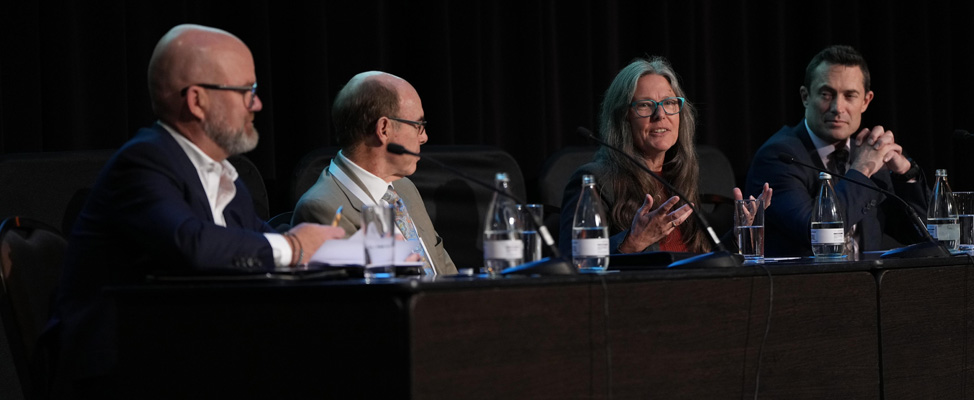Key points
- This article follows a session on the impact of increased natural disasters on insurers and their customers at the 2023 ASIC Annual Forum in Melbourne.
- ASIC has identified three areas of improvement across the insurance sector, needed to ensure good consumer outcomes - making good on pricing promises, better claims handling practices and strengthened product design and distribution.
- At a time when extreme weather events are becoming more frequent, insurers need to adapt to ensure they can balance the need for affordable, quality products with sustainable business models.

Andrew Hall, John Trowbridge, Karen Cox and Nathan Bourne speaking during the 2023 ASIC Annual Forum.
Insurers, experts and consumer advocates discussed the growing insurance “protection gap” for Australians amid increasing fires, floods and other natural disasters at the ASIC Annual Forum on Wednesday.
Climate change-driven natural disasters are increasing premiums for insurance customers, compounding other cost-of-living pressures.
Data from the Actuaries Institute released in August found a 28% increase in median home insurance premiums over the previous 12 months. For the highest risk properties – the 5% of highest premium paying households that increase was 50%.
Karen Cox, CEO of the Financial Rights Legal Centre, said they are receiving calls from people across the country who have had claims denied after extreme weather events or have seen insurance premiums rise significantly in the aftermath of disasters.
“The big issue that springs to mind are those extreme cases we have in Lismore where people are looking at premiums of $15,000 to $25,000 for flood insurance. That is not affordable for anybody, or very few people at all,” Ms Cox said.
Insurance industry expert John Trowbridge said many customers did not have adequate insurance coverage.
“The average underinsurance for the Canberra 2003 bushfires and the Victoria Black Saturday bushfires was about 40% so it’s a big issue here,” Mr Trowbridge said.
“We appear as a country more prone to disasters in large residential areas than others. With climate change, this is a really expensive problem.”
Ms Cox said subsidies should be considered to help alleviate the burden on individual customers, as the way the current system worked was like a “high stake game of musical chairs”.
“What we have at the moment is the risk being borne by random individuals who have no responsibility for what’s occurring,” Ms Cox said.
However, Executive Director and CEO of the Insurance Council of Australia, Andrew Hall, said the experience of other countries showed that subsidies were not a panacea.
“What we’re talking about here is the protection gap and we’re not alone, it’s a global problem,” Mr Hall said.
“It’s not that insurers are against these things but what we’ve seen around the world is these pools often mask the price of risk.
“We’d never want a situation like the United States where the Federal Government wrote off a $16 billion flood insurance pool.”
ASIC has called on general insurers to improve their claims handling practices and resourcing after a review of home insurance claims found weaknesses across five key areas.
Background
The ASIC Annual Forum brings together thought leaders and experts to explore strategies for adapting and evolving in a time of geopolitical, economic and technological change. The theme of this year’s event is ‘Navigating Disruption’.
The session, ‘Disruption by natural disasters’ was moderated by Nathan Bourne, Senior Executive Leader, Credit, Banking and General Insurance, ASIC.
The panel included:
- John Trowbridge, Insurance industry specialist and author of Independent Review of Strata Insurance Practices
- Andrew Hall, Executive Director and CEO, Insurance Council of Australia
- Karen Cox, CEO, Financial Rights Legal Centre
Read more
- View more highlights from the ASIC Annual Forum, 21-22 November 2023
- ‘The Princess and the Pea’: Getting the basics right in insurance
- General insurers to repay consumers $815 million for broken pricing promises
- ASIC review finds insurers can and should improve claims handling
- ASIC review of insurance target market determinations